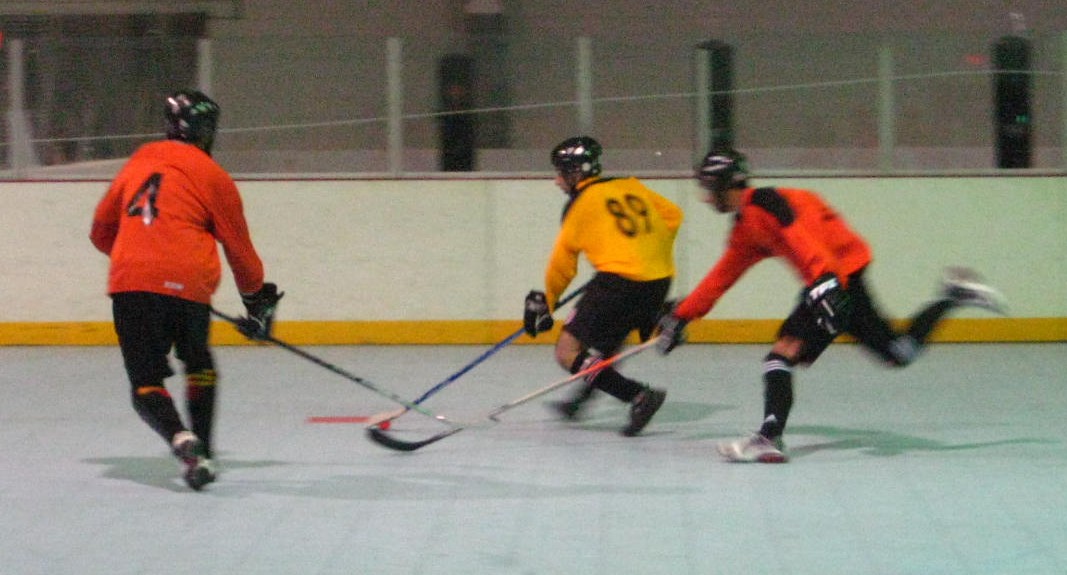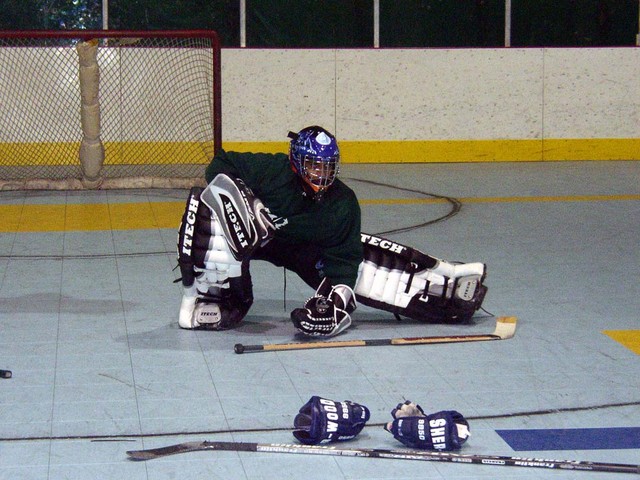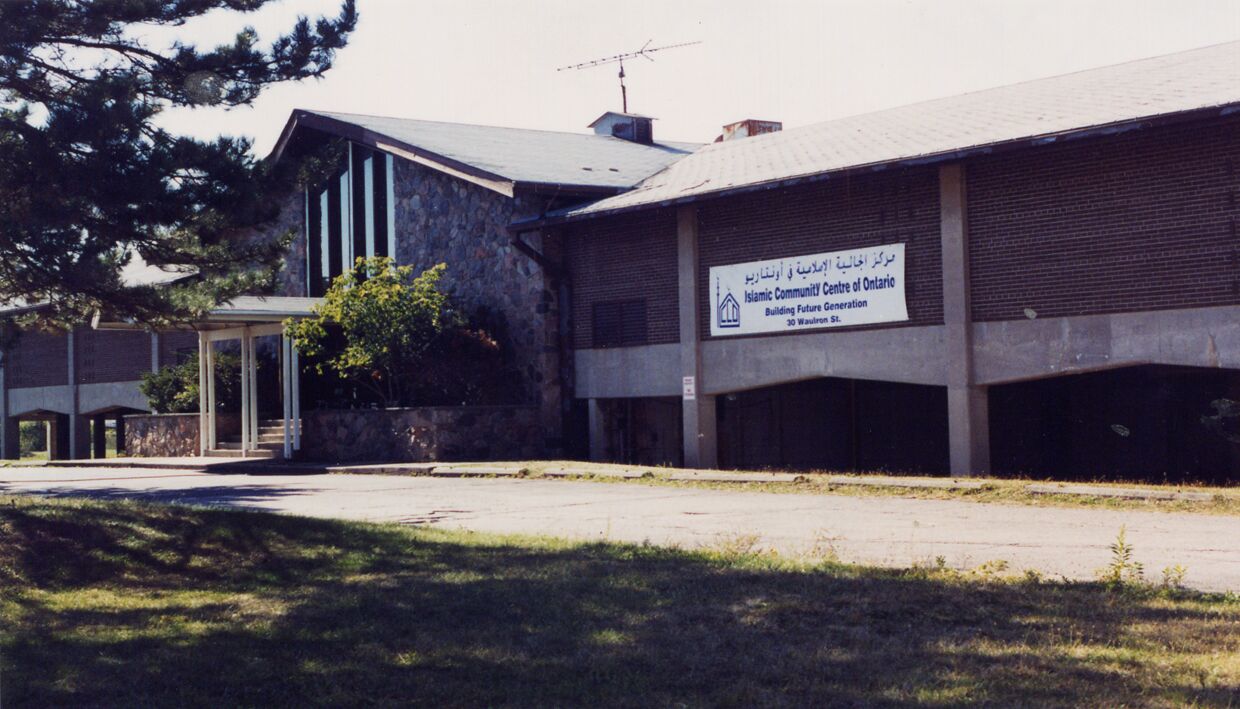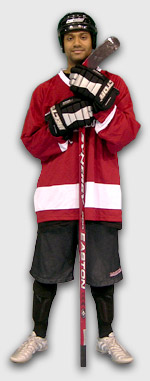
|
|
 |
 |
 |
 |

| Part III: The Growth of Muslim Ball Hockey |
 |
By: Nauman Abbasi
 In January 2008, recognizing that demand was exceeding capacity for Weekly Hockey, Nauman Abbasi came up with an idea: the need to create a hockey league that allowed for more players to take part but maintained a high level of competitiveness and personal conduct. After bouncing the idea off friend and original Weekly Hockey participant Sadegh Rasoul, Abbasi had a framework for what the league would entail: a draft-based league that spread elite talent across all teams, a strict adherence to maintaining a high level of personal conduct and a philosophy to donate all proceeds to charity in order to benefit more people than just those who actively took part in the league.
In January 2008, recognizing that demand was exceeding capacity for Weekly Hockey, Nauman Abbasi came up with an idea: the need to create a hockey league that allowed for more players to take part but maintained a high level of competitiveness and personal conduct. After bouncing the idea off friend and original Weekly Hockey participant Sadegh Rasoul, Abbasi had a framework for what the league would entail: a draft-based league that spread elite talent across all teams, a strict adherence to maintaining a high level of personal conduct and a philosophy to donate all proceeds to charity in order to benefit more people than just those who actively took part in the league.
With a framework set, Abbasi and Rasoul would then approach Kashif Taqiuddin, lead organizer of I-Slam Basketball, about the league and how it would work. After years of wanting to create a hockey division for I-Slam Athletics, Taqiuddin agreed that the league's principles and framework was sound and insisted on branding the league as I-Slam Hockey. The logic made sense: combine a league that upheld a high level of personal conduct with a brand that had made its name synonymous with Muslim athletics in the Greater Toronto Area. Thus, I-Slam Hockey was born.
However, there was much work to be done. The idea came about very quickly - some say Abbasi had a eureka moment while others insist that Abbasi decided to mimic the National Hockey League (NHL) instead - and for the league to be able to run effectively out of Ultimate Sports Centre in the available timeslots, marketing and registration would have to be conducted just as quickly. With the help of many individuals including newly-appointed league organizers Ibrahim Hindy, Zuhair Fancy and Fuzail Thakur, the word spread about this new creation that would help meet the needs of the Muslim ball-hockey community. In a record-period of just seven days, registration took place with 90 participants registered and paid for the league knowing full-well what the format and procedure for the league would be. Considering the slow-paying nature of Muslims in the ball hockey community due to the high amount of fees, the feat probably stands at an all-time record!
The next job would be to select general managers for each of the five teams. With a robust collection of personalities registered to take part in I-Slam Hockey, it was necessary that each of the general managers be a person capable of handling those personalities effectively while being able to command the necessary respect to run their teams. Bilal Buttar, Dilawar Alvi, Emmad Khawaja, Rizwan Kalair and Usama Mahmood would step forth to be general managers due to their levels of respect amongst all participants both as players and as adherents to the tenets of the league.
Perhaps the most anticipated part of starting I-Slam Hockey, the player draft, was next on the agenda. Putting all players in the selectable pool and determining the order of the picks by picking names from a hat, the process would take place over two hours while munching on food in the basement of Dilawar Alvi's house. The draft results, with exception of the first two rounds of picks, would not be made public in order to avoid any undue embarrassment to those selected later in the draft. This policy would eventually change in future seasons after much demand by players and fans alike.
With the league providing all players and teams with jerseys as part of the registration fee, jerseys would need to be ordered right away to arrive in time for the start of the season. The jerseys, though not some of the most aesthetic jerseys to date, would arrive just two days before the start of the season. One player, Saajid Bhayat, would term the jerseys worn by one of the teams, Shukr, as the "ooltee-jerseys", a reference to the colour of vomit in the Urdu language (and several other languages). To Bhayat's credit, "ooltee" was probably the best way to describe the colour of those particular jerseys since no other term could effectively capture the essence of that colour nor immediately allow so many Pakistani and Indians to immediately understand.
The league would run without a hitch. Inspired by the Montreal Muslim Ball Hockey Tournament's strict adherence, I-Slam Hockey implemented a "no-swearing" rule which would help set the standard that was expected. Any player who uttered a swear-word, whether to himself or to another individual, would be assessed a penalty and sent to the penalty box. The rule, questioned by some as not being possible to effectively implement amongst a community that would have less tolerance for it, would turn out to be a huge success as many players, including some of those who were caught breaking it, agreed that it was a good way to help keep tempers under control and remind players of the Islamic ideal of controlling one's tongue.
I-Slam Hockey would turn out to be a huge success on many fronts resulting in future seasons. The league has grown from the original 90 participants to 162 players divided into two tiers of competition. In order to meet the needs of the growing Muslim ball hockey community, the question now stands at what does the future have in store for I-Slam Hockey? In terms of the larger picture, where is the Muslim ball hockey community headed? In the coming months, much lays on the horizon that could change the landscape of Muslim ball hockey and the future of I-Slam Hockey.
|
 |
 |
 |

| Part II: The Rise of Muslim Ball Hockey |
 |
By: Nauman Abbasi
 The Ultimate Sports Centre, located at the borders of Vaughan and Brampton north of Lester B. Pearson International Airport, was the next step in the growth of Muslim ball hockey. The facility, a "bubble" built in an isolated farming community, housed a soccer field, an indoor golf-driving range and an outdoor golf course in addition to the singular ball hockey arena at the back. The powder-blue vinyl playing surface for the ball hockey arena, now becoming the flooring-of-choice for many ball hockey pads around the world, was a change for the group after using concrete floors elsewhere.
The Ultimate Sports Centre, located at the borders of Vaughan and Brampton north of Lester B. Pearson International Airport, was the next step in the growth of Muslim ball hockey. The facility, a "bubble" built in an isolated farming community, housed a soccer field, an indoor golf-driving range and an outdoor golf course in addition to the singular ball hockey arena at the back. The powder-blue vinyl playing surface for the ball hockey arena, now becoming the flooring-of-choice for many ball hockey pads around the world, was a change for the group after using concrete floors elsewhere.
The Weekly Hockey group, buoyed by the larger facility and pleased with the additional playing space, took to the facility quickly. The numbers continued to grow with more and more participants coming out to play from even further distances. Some of today's prominent talents honed their skills on the floor of the Ultimate Sports Centre thanks, in large part, to being given the opportunity to play in a comfortable environment. Naveed Sheraly, captain of the Shaolin Monks team that won Pool-A of the 2010 Salaam Cup Tournament, was one such individual who made the trek from afar for Weekly Hockey seeing as how he resided in Ajax, Ontario at the time. Dr. Farhan Siddiqui, a former resident of Hamilton, Ontario and a graduate of the University of Western Ontario's medical program in London, Ontario, would make the commute each week from Hamilton or London in order to play.
Additionally, the success of the now-annual Salaam Cup Tournament in nearby Mississauga bred even greater desire for competitive ball hockey action within the Muslim community. This would not be limited to just the residents of the Greater Toronto Area. Individuals from Montreal, Quebec visiting the Greater Toronto Area for a weekend, would go as far as to alter their travel schedules in order to attend Weekly Hockey. One such individual was Faisal Shahabuddin, captain of the Montreal Islamique who competed at The Salaam Cup Tournament each year, who would drop in when possible in order to play. From Weekly Hockey to OBHA league games taking place each and every day, Ultimate Sports Centre became the hub for ball hockey for many across the city and from afar.
Despite the growing popularity of Ultimate Sports Centre, the facility would not come without its faults. Availability was limited as several sports programs used Ultimate Sports Centre's ball hockey arena including roller hockey and lacrosse. However, through the continued commitment of everyone who attended, it became clear to the facility's management that the Weekly Hockey group provided an opportunity to reach a diverse market segment that was consistent, committed and easy to work with. Availability for the facility would not become a problem for the Weekly Hockey group thereafter.
In 2007, Ultimate Sports Centre would also become the site for the Pakistani national ball hockey team's tryouts for roster spots in addition to Rinx Arena in North York, Ontario. After a satisfactory inaugural performance in the 2005 International Street & Ball Hockey Federation World Championships in Pittsburgh, Pennsylvania using a roster composed mostly of Greenbirds players and a few individuals from Montreal, Pakistan's management was seeking new talent for its 2007 edition that was to compete in Dusseldorf, Germany. The tryouts, coordinated by Pakistan Ball Hockey Federation (PBHF) General Manager and Coach Dr. Naveed Mohammad, would result in many hopefuls coming out from across the city as well as a few individuals from Montreal and Calgary, Alberta. Pakistan's national team would go on to win the gold medal of Pool-B in the World Championships at Dusseldorf, Germany. The sport was growing and it was clear that the number of participants and the corresponding talent level within the Muslim community was growing with it.
The Weekly Hockey group continued to grow with over 80 individuals wishing to take part. Meanwhile, numbers were dwindling at the now-defunct Muslim Ball Hockey League (MBHL), a league that took place in gym venues in the Thornhill, Ontario area, after operating for several years. The MBHL would see several of its players move on to a new league run by Waheed Mohammad based out of Scarborough, Ontario then-known as the Islamic Hockey League (IHL). The IHL, which was the benefactor of several youth leagues before it including the Islamic Ball Hockey Association (IBHA) run by Khalid Raheem during the 1990's, would later be re-branded as the Madina Hockey League (MHL) in 2008 after Safi Habib joined Waheed Mohammad in a managerial capacity.
With the MHL now in full operation and the numbers for Weekly Hockey continuing to grow, it became clear that not everyone could be reasonably accommodated unless more rink time was obtained across the city or a fundamental change took place at Ultimate Sports Centre to increase capacity. That change would come in early 2008 when I-Slam Hockey was born.
Part III - Next Week...
|
 |
 |
 |

| Part I: The Start of Muslim Ball Hockey |
 |
By: Nauman Abbasi
 Back in 2002, a few Muslim brothers from Ryerson University decided that they wanted to play ball hockey somewhere on a Friday night. They enjoyed talking about hockey and playing hockey but they lacked a venue for where they could play due to the lack of organized programs at the time in the Muslim community. Considering that most Muslims came from immigrant backgrounds and did not get the chance to play ice hockey as most Canadian youth do, street hockey was often the closest many came to the world of the NHL. This changed when one person from the group, Zia Bangash, informed the rest about the Islamic Society of York Region in Stouffville, Ontario and its multi-purpose room which could be used for sports. Intrigued at the prospect of playing hockey despite the remote location, the group decided to give the facility, known by most people as Stouffville Masjid, a try.
Back in 2002, a few Muslim brothers from Ryerson University decided that they wanted to play ball hockey somewhere on a Friday night. They enjoyed talking about hockey and playing hockey but they lacked a venue for where they could play due to the lack of organized programs at the time in the Muslim community. Considering that most Muslims came from immigrant backgrounds and did not get the chance to play ice hockey as most Canadian youth do, street hockey was often the closest many came to the world of the NHL. This changed when one person from the group, Zia Bangash, informed the rest about the Islamic Society of York Region in Stouffville, Ontario and its multi-purpose room which could be used for sports. Intrigued at the prospect of playing hockey despite the remote location, the group decided to give the facility, known by most people as Stouffville Masjid, a try.
A barnyard that had been converted into a multi-purpose room would serve as the playing ground for the group. Two hockey nets, weak but usable, and several chairs and tables were strewn about upon entry each week. Those who came to play would take the time to move each piece of furniture to the corners of the facility, sweep the floor if required and move any other peripheral items to where the chairs and tables were stored. Considering that the facility was not that big to begin with, every inch of space was needed in order to maximize the ability to play hockey in the room.
Participants would come from across the city to take part. Many would bring friends and as word-of-mouth about the weekly program spread, the group grew. More and more Muslims wanted to play ball hockey at the facility on a regular basis even though the location was less-than-desirable for most. The talent level of the brothers who came out each week varied but one thing was certain: the venue was quickly becoming incapable of handling the number of attendees that came out each week. During this time, other groups of ball hockey-adoring Muslims also began to play diligently across the city. From the neighborhoods of Scarborough to the suburbs of Mississauga, the demand to play hockey grew and the demand to take part in the weekly activities at Stouffville Masjid could not keep pace within the walls of the multi-purpose room.
Despite the success of the weekly event, the program, dubbed Weekly Hockey, would not come without its challenges. Management at Stouffville Masjid was also facing demand from other programs wanting to use the multi-purpose room. After all, it was a multi-purpose room and that meant that it could be used for banquets, weddings and more. This put a further strain on the Weekly Hockey group as the venue was becoming increasingly difficult to attain due to the increase in non-sporting bookings. The inability to secure the facility on a weekly basis would only further precipitate the need for a new venue.
In 2003, after being informed by Abdul-Aziz Rasoul of the now-defunct Islamic Community Centre of Ontario (ICCO) and its antiquated curling rinks, the Weekly Hockey group decided to change locations in order to continue their weekly sporting tradition. With Stouffville Masjid not being available on a regular basis, it left little choice for the Weekly Hockey group but to seek a new venue and ICCO would meet that need. However, Friday nights would initially be unavailable which forced the group to play on Saturday mornings instead. This is where the ball hockey movement within the Muslim community, especially those of Mississauga, Brampton and Etobicoke, would begin to thrive.
From 2003 to 2005, ICCO would serve as the playing grounds for a diversified and still-growing Weekly Hockey group. Nauman Abbasi, part of the original group that played at Stouffville Masjid, would be thrust into becoming the lead organizer of Weekly Hockey to help ensure that it continued. With the help of many regular participants, the program would thrive and Abbasi would eventually shift the program back to Friday nights. The talent level of the group was also increasing prompting some to suggest that it was time to step up to another level of competition. Inspired by the Greenbirds, a club team consisting of Muslims from Brampton, some of which who came out to ICCO to play with the larger Weekly Hockey group, more club teams started to form. ICCO would also see the start of the Crescent Knights hockey team as well as several offshoots.
In 2004, occasional Weekly Hockey participants Safi Habib and Farhan Baig, with the help of several volunteers from the Weekly Hockey group, organized the ICCO Invitational Tournament. The tournament would serve as one of the first opportunities for many to witness the growth of Muslim ball hockey from across the city since most of the programs operated within their own enclaves or areas. The tournament would also serve as the first opportunity for many to measure their own ability and that of their teams against capable opposition. Additionally, the tournament, a precursor to The Salaam Cup, would see a team from Montreal, Canada take part alongside the plethora of Greater Toronto Area teams. It was clear that the Greater Toronto Area was quickly becoming home to something different when it came to the Muslim community.
In 2005, motivated by their growing appetite for organized league action and due to the growth and talent level of the ball hockey community exceeding the confines of ICCO, the Weekly Hockey group would decide to take another step to enhance the program. Rink hockey, for which club teams took part in through the Ontario Ball Hockey Assocation (OBHA) and its various leagues across the city, was the next step to cultivating the talents of many. A change in venue was also necessary as ICCO was due to be demolished due to the sale of its property to another corporation. The timing seemed right and thus, the Weekly Hockey group moved to its new venue: Ultimate Sports Centre.
Part II - Next Week...
|
|
 |
 |
|



